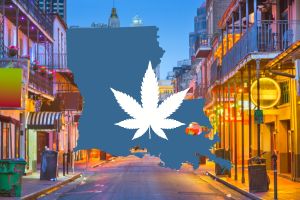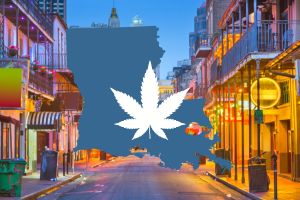Is CBD Flower Legal in Louisiana?
Posted by Tweedle Farms on Jul 13th 2021

Navigating the Hemp Landscape in Louisiana
In the ever-evolving world of cannabis regulations, Louisiana presents a unique case study, especially when it comes to hemp-derived consumer goods such as CBD flower, CBD gummies, pre rolls, etc. Understanding the legal framework is crucial not only for those involved in the industry but also for consumers aiming to make informed decisions. This article delves into the intricacies of hemp legislation in Louisiana, addressing common concerns and providing clarity on the state's stance.
The Legal Status of Hemp in Louisiana
The 2018 Farm Bill marked a pivotal moment in the history of cannabis legislation in the United States by legalizing hemp at the federal level, defining it as the Cannabis sativa L. plant with a delta-9 tetrahydrocannabinol (THC) concentration of not more than 0.3% on a dry weight basis. Louisiana, aligning with this federal mandate, has enacted its own set of regulations governing the cultivation, processing, and sale of hemp and hemp-derived products.
In Louisiana, the Department of Agriculture and Forestry oversees the hemp industry, requiring all growers, processors, and retailers to obtain the necessary licenses and permits. This regulatory framework ensures that all hemp products in the market, including hemp flower, comply with state and federal standards, particularly in terms of THC content.
Understanding Hemp Flower, CBD Flower, and THCA Flower
The terms "hemp flower," "CBD flower," and "THCA flower" often cause confusion among consumers due to their close association with cannabis. Here's a breakdown to clarify:
- Hemp Flower: Refers to the bud of the hemp plant, which is rich in CBD and other cannabinoids but contains less than 0.3% THC, making it legal under Louisiana law. In this form, the buds are typically used for extraction and subsequent product formulation.
- CBD Flower: Essentially the same as hemp flower, but this term denotes a product with more aesthetic appeal. Typically, CBD flower will look and smell indistinguishable from THC-rich cannabis.
- THCA Flower: Contains THCA, a non-psychoactive precursor to THC that converts to THC when exposed to heat. Because cannabis plants only produce acidic cannabinoids (eg CBD-rich cannabis produces CBDA which is then converted into CBD by heat), “THCA flower” is actually just good old-fashioned marijuana with new branding.
Stakeholder Concerns and Legal Considerations
For industry participants, the nuanced legal landscape of hemp in Louisiana presents several challenges and considerations:
- Compliance and Testing: Stakeholders must ensure their products are rigorously tested to meet the state's THC threshold. Non-compliance can lead to significant legal repercussions, including fines and revocation of licenses.
- Labeling and Marketing: Louisiana mandates strict labeling and marketing guidelines for hemp products to prevent misleading claims, particularly regarding health benefits. Stakeholders must navigate these regulations carefully to avoid penalties.
- Interstate Commerce: While the 2018 Farm Bill allows for the interstate commerce of hemp, stakeholders must be cognizant of the laws in other states where their products may be sold or transported.
Consumer Considerations
Consumers in Louisiana looking to purchase hemp-derived products like gummies, capsules, or pre-rolled joints should be mindful of several key points:
- Product Sourcing: Purchasing hemp products from reputable, licensed retailers ensures compliance with state and federal laws and guarantees product quality and safety.
- Legal Implications: Possession of hemp products that exceed the legal THC limit could be mistaken for illegal cannabis, potentially leading to legal issues. Consumers should always carry proof of purchase and lab reports indicating THC content when possible.
- Health Claims: While hemp-derived CBD has been touted for various health benefits, consumers should approach such claims with caution and consult healthcare professionals for medical advice.
Conclusion
The legal landscape of hemp in Louisiana is a dynamic and complex field that requires careful navigation by both industry stakeholders and consumers. While the state's regulations aim to align with federal standards, ensuring the legal and safe use of hemp products, including CBD flower, the responsibility falls on all parties to stay informed and compliant.
As the industry continues to evolve, so too will the regulations governing it. Stakeholders should remain vigilant, adapting to legal changes to ensure sustainable operations. Consumers, on the other hand, should prioritize education and diligence in their hemp product choices, ensuring their experiences are not only legal but also beneficial.
The journey of hemp in Louisiana is a testament to the broader national shift toward acceptance and regulation of cannabis-derived products. By fostering a well-regulated hemp industry, Louisiana can ensure the safety and satisfaction of consumers while supporting the growth and innovation of stakeholders in this burgeoning market.



